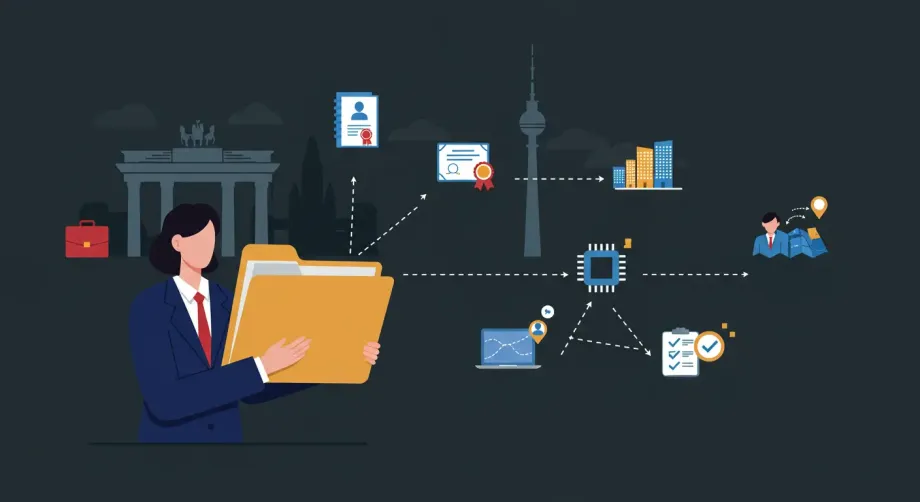
Nicht-EU-Fachkräfte in Deutschland einstellen (2025): klare Wege jenseits der EU Blue Card
Ich berate Arbeitgeber bei der rechtssicheren, schnellen Einstellung von Nicht-EU-Talenten. Unten ist eine praktische Karte der wichtigsten Wege neben der EU Blue Card – wofür sie taugen und wie Sie Verzögerungen vermeiden.
Warum das jetzt wichtig ist
Das Fachkräfteeinwanderungsrecht hat Wege erweitert und Schritte vereinfacht. Das hilft nur, wenn Sie pro Fall den richtigen Weg wählen. Falsch kostet Wochen. Richtig spart Zeit und Risiko.
Die Hauptwege neben der EU Blue Card
1) Fachkräfte 18a/18b
Wann passend: anerkannter Abschluss (Berufsausbildung oder Hochschulabschluss) und passendes Jobangebot. Anerkennung oft vor Einreise nötig – außer es greift ein anderer Weg.
2) IT-Spezialisten mit Berufserfahrung (19c(2))
Wann passend: erfahrene IT-Profile ohne Hochschulabschluss. Arbeitsvertrag und Nachweise der Praxis sind zentral.
3) Anerkennungspartnerschaft
Wann passend: Abschluss noch nicht anerkannt, aber Beschäftigung schon möglich. Arbeitgeber und Arbeitnehmer verpflichten sich, die Anerkennung nach Einreise in DE durchzuziehen.
4) ICT-Karte (Intra-Corporate Transfer)
Wann passend: befristete Versetzung von Führungskräften, Spezialisten oder Trainees aus einer Nicht-EU-Gesellschaft zur deutschen Einheit. Ermöglicht bestimmte EU-Mobilität.
5) Westbalkan-Regelung (Kontingentspur)
Wann passend: Bewerber aus den Westbalkan-Staaten in nicht reglementierten Berufen, innerhalb eines Jahreskontingents. Praktisch für operative Rollen.
6) Chancenkarte → Wechsel in Beschäftigung
Wann passend: Einreise zur Jobsuche (Punktesystem). Teilzeit und kurze Probearbeit möglich. Bei Angebot: Wechsel in regulären Titel.
Welcher Weg wann? (einfache Karte)
- Passender Abschluss/berufliche Anerkennung? Start mit 18a/18b.
- Starke IT-Praxis ohne Abschluss? 19c(2).
- Anerkennung noch offen, Beschäftigung möglich? Anerkennungspartnerschaft.
- Interner Transfer aus Konzern außerhalb der EU? ICT-Karte.
- Westbalkan-Profil, Job passt ins Kontingent? Westbalkan-Regelung.
- Noch kein Angebot, starkes Profil? Chancenkarte → späterer Wechsel.
Vertrag & Compliance (schnelle HR-Gewinne)
- Job–Qualifikation: Titel und Aufgaben müssen zum Weg passen.
- Vergütung: marktüblich und wege-konform; teils behördische Prüfung.
- Anerkennung & Lizenzen: Schritte früh planen; Meilensteine schriftlich festlegen.
- Onboarding-Timing: Puffer für Visa-Termine, Prüfungen, Biometrie.
- Policies: Probezeit, Arbeitszeit/Erfassung, Remote/Hybrid, Vertraulichkeit. Wettbewerbsverbot nur rechtskonform (inkl. Entschädigung).
Mein Ablauf für Arbeitgeber
- Weg wählen: Kandidat sauber mappen (18a/18b, 19c(2), Anerkennung, ICT, Westbalkan, Chancenkarte→Wechsel).
- Nachweise sammeln: Abschluss/Anerkennung oder Praxiserfahrung, CV mit Aufgaben, Referenzen, Lizenzen (falls reglementiert), klare Stellenbeschreibung.
- Vertrag ausrichten: Titel, Aufgaben, Gehalt passend zum Weg; HR-/Kandidaten-Checkliste anhängen.
- Behörden koordinieren: Anerkennung, Zustimmungen, Termine; eine feste Ansprechperson.
- Wechsel/Verlängerung planen: bei Chancenkarte/Anerkennungspartnerschaft früh terminieren.
Häufige Fehler (und Abhilfe)
- Falscher Weg: erst Weg entscheiden, dann Vertrag schreiben.
- Lücken bei Nachweisen: Praxis für 19c(2) oder Anerkennungsakte unvollständig.
- Titel–Aufgabe passt nicht: Immigration ≠ Vertrag – Beschreibung präzisieren.
- Wechsel zu spät geplant: Chancenkarte→Beschäftigung vergessen.
- Leitzeiten unterschätzt: Konsulat, Termine, Biometrie brauchen Puffer.
FAQs
Können wir IT-Talente ohne Abschluss einstellen?
Ja, über 19c(2) mit nachgewiesener Berufserfahrung und passendem Vertrag.
Braucht es immer Anerkennung vor Einreise?
Nein. Mit Anerkennungspartnerschaft kann Anerkennung in DE laufen – bei erfüllten Vorgaben.
Wann nutzt man die ICT-Karte?
Bei befristeten Konzernversetzungen (Manager, Spezialisten, Trainees) aus Drittstaaten.
Wozu dient die Westbalkan-Regelung?
Für Bewerber aus der Region in nicht reglementierten Berufen innerhalb des Jahreskontingents.
Darf man unter Chancenkarte arbeiten?
Ja, begrenzt (Stunden/Jobtrials). Bei Angebot: Wechsel in Beschäftigungstitel.
Vereinbaren Sie eine persönliche Beratung. Ich mappe den richtigen Weg, richte Vertragstexte an den Regeln aus und plane ein klares Onboarding.
Weiterführend (offiziell)
- Make it in Germany — Work visa for qualified professionals (Sections 18a/18b)
- German Missions — IT specialists with professional experience (Section 19c(2))
- Make it in Germany — Employment within a recognition partnership
- Make it in Germany — Intra-corporate transfer (ICT) card
- EU Immigration Portal — ICT Germany
- Update — Western Balkans Regulation quota increase
- BMI — Opportunity Card (from 1 June 2024)
Hinweis: Dieser Beitrag ersetzt keine individuelle Rechtsberatung.









